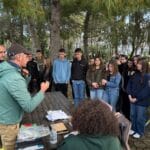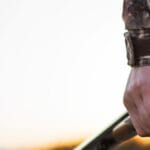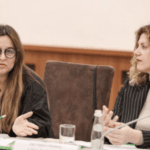Huge Dalmatian Pelicans, vibrant flamingos, and colourful bee-eaters. These are just a few of the first birds that captured my attention after I moved to Albania from the United States last year. My family and I came knowing we would have only 2 years here, so I felt a sense of urgency to explore all of the rich experiences Albania has to offer. I quickly discovered the breathtaking beauty of Albania’s forested mountains, gorgeous beaches and serene wetlands. I became mesmerized by the abundance of unfamiliar birds that I am still learning to identify. And I realized that two years would never be enough to take it all in. What a remarkable array of incredible natural beauty this country has to offer.
Of course, it didn’t take long to discover that, as in many places around the world, Albania’s beautiful natural environment, and the birds and other wildlife supported therein, are being seriously threatened and harmed by human activity. So I’ve been grateful for the opportunity to volunteer with AOS as a way to contribute to protecting this environment. As a volunteer, I have followed AOS projects addressing threats to the avifauna of Albania on multiple levels, from combating direct and deliberate harm to birds in the form of illegal killing and trapping, to larger-scale battles, such as that against the development of “Divjaka Resort Albania” at the National Park Divjaka-Karavasta (which threatened a severe impact on an immensely important ecosystem). The results of their work on these and other projects have been impressive and dramatic.

© Calese Stoddard / Albania
One aspect of the work of AOS which I believe is as important as these larger, more visible projects is the work of educating and raising awareness of the ways that we as humans can help our environment and the avifauna it supports. The results of this effort are more difficult to measure, but no less far-reaching and drastic. Taking students on educational excursions in Divjaka-Karavasta National Park, visiting classrooms to educate students on bird conservation, and promoting the development of environmental education programs are a few of the ways that AOS is bringing issues of bird conservation to the awareness of the rising generation. Teaching the youth of today about the importance of protecting delicate ecosystems that support wildlife will change the way these students think about the environment and how their actions affect it, thus having an impact for years to come.

AOS volunteer, Calese / AOS team
I think that on a basic level we all want a healthy environment, with less negative human impact, and thriving biodiversity. But for those of us who are less experienced in the field of conservation, we sometimes catch ourselves inadvertently trampling on the environment simply because we make the assumption that someone else has thought it through. We might discover that we are a regular consumer of a product whose production does widespread damage to the environment. Or perhaps, in our eagerness to explore and enjoy nature, we find ourselves disrupting the very wildlife we came to enjoy observing. It is easy to rely on companies, institutions, and developers to make environmentally informed decisions so that we can enjoy their products and services without worrying about it, where often they haven’t considered the well-being of the environment at all. Volunteering with AOS has opened my eyes to the capacity each of us has to contribute to protecting the environment and the wildlife it supports, as well as the sense of responsibility we should each feel toward this work. It has made me want to become more environmentally informed so that my actions coincide with what I want for our planet and its biodiversity.
The work of the NGO coalition led by AOS who fought against the development of “Divjaka Resort Albania” protected the habitat of the Dalmatian Pelicans not only by stopping the developer who planned to build the resort, but also by stopping the thousands of tourists who would have unknowingly disrupted the immensely important ecosystem of National Park Divjaka-Karavasta by vacationing at the resort. Thankfully, in this case, one large decision prevented many problems. But in situations where we can’t control the larger decisions about how our environment is treated, we can still reduce harmful human activities by helping people to stop and think about the effects of their individual actions. When serious concerns about threats to the environment, or more specifically, to individual species with which we feel a personal connection, are brought to our attention, we learn to tread more carefully upon the environment that we all want to enjoy.
In their projects to raise awareness, AOS is giving us a bigger picture of how our individual actions affect global conditions. And since global change depends on individual change, what could be more effective than changing one mind at a time?

[/et_pb_text][/et_pb_column][/et_pb_row][et_pb_row _builder_version=”3.26.3″][et_pb_column type=”4_4″ _builder_version=”3.26.3″][/et_pb_column][/et_pb_row][/et_pb_section]





